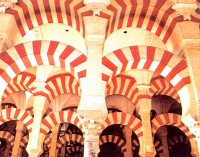Despite years of relentless efforts, the construction of a stately mosque remains a costly dream for Muslims in the southern city of Seville, the capital of the autonomous community of Andalusia.
“We are still negotiating with city officials to find a solution for the mosque issue,” Muslim community leader Malik Roueth told IslamOnline.net.
After municipal officials reneged on several promises to allocate a plot of land for the mosque, the sizable Muslim community is left with no other option but buy one. “We need no less than 6 million euros,” said Roueth, citing rocketing land prices in the area.
Plans to build a purpose-based mosque in Seville have been met with fierce oppositions from some locals. A few months ago, authorities froze plans to allocate a plot of land for Muslims to build their mosque after protests. Opponents has left slaughtered pig heads at the location, believing such a move would push Muslims to drop the plans.
In reaction to the protests, the authorities withdraw the land even though by that time Muslims had spent more than 200,000 euros to prepare the land for the mosque construction.

 Spain’s Equality Minister Bibiana Aido has angered Muslims by criticizing the Islamic headscarf, alleging that it undermines the rights of women, media reported Thursday. Muslim men could dress in Western clothes, Aido said, asking why women wearing loose clothes and headscarves could not do the same.
Spain’s Equality Minister Bibiana Aido has angered Muslims by criticizing the Islamic headscarf, alleging that it undermines the rights of women, media reported Thursday. Muslim men could dress in Western clothes, Aido said, asking why women wearing loose clothes and headscarves could not do the same. Spain will host a two-day international conference to discuss the roots of discrimination and hostility toward Muslims in the West. The conference is held under the aegis of the Organization for Security and Cooperation in Europe (OSCE) in the historical city of Cordoba in southern Spain, once the symbol of Islamic civilization in the Iberian peninsula.
Spain will host a two-day international conference to discuss the roots of discrimination and hostility toward Muslims in the West. The conference is held under the aegis of the Organization for Security and Cooperation in Europe (OSCE) in the historical city of Cordoba in southern Spain, once the symbol of Islamic civilization in the Iberian peninsula.